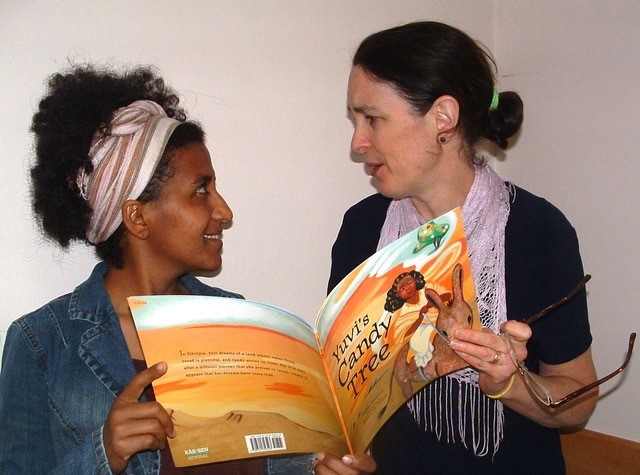Yuvi’s Candy Tree, by Lesley Simpson, is based on the true story of Yuvi Tashome’s extraordinary journey from Ethiopia to Israel with her grandmother as part of Operation Moses. In this story behind the story, author Lesley Simpson shares how the book came to be, including her dream of publishing a Hebrew translation.
I met Yuvi Tashome in 2009 in Toronto. She was giving a talk as a guest of the New Israel Fund and working to raise money for an NGO she had created to help the Ethiopian Israeli community. In this talk in Toronto she mentioned—as an aside—that she was one of the people on Operation Moses. Operation Moses was one of the airlifts of Ethiopian Jews to Israel. They had fled Ethiopia on foot to make it to a refugee camp in the Sudan. Yuvi was just a child in 1985, traveling with her grandmother.
I used to work as a journalist for Canadian daily newspapers. I had never met anyone who was part of the airlift of Ethiopian Jews to Israel, and I sensed there was an untold story. I booked an interview with Yuvi, thinking I might write a profile about her. However, when she told me her history of Aliyah (moving to Israel) I felt as if the Passover Haggadah were coming alive in my hands. I felt transported. I felt she had honored me with a profound gift, and I wanted to return the honor by telling her history.

I went to Israel in 2011 to help launch the book Yuvi’s Candy Tree with Yuvi and other Israelis, but the book was in English. We made the launch work with me reading the English and Yuvi translating the book into Hebrew for the community that gathered together to listen to the story. There were kids in the audience who asked, “Is this true? You tricked robbers?” “Yes,” Yuvi answered. A story about a kid their age who had outwitted career criminals? The kids were mesmerized.
When I do a reading I like to have a fun activity afterwards. In Beit Shemesh, where we held this one, the kids got to make their own candy trees, and that turned out to be a popular way to make the launch even sweeter, literally. But I wanted something more. I dreamed of having the book in Hebrew. So I started knocking on the doors of Israeli publishers. I collected a lot of rejections, but I kept searching.
I was delighted when the book won the Canadian Jewish Book award for youth in 2012, and I was equally delighted when PJ Library chose the book as a selection in April, 2017. But I held onto this dream of a Hebrew translation. First, I wanted the book to be in Hebrew because I wanted the story to live in Israel. I also wanted the book to be in Hebrew because I wanted to honor a remarkable chapter of Jewish history. Finally, I wanted the book to be in Hebrew because I fell in love with the language I am still learning as an adult.
Once the Hebrew translation was a reality, the response was remarkable. The President of Israel Reuven Rivlin recommended the book on his Facebook page. A lawyer and philanthropist, whom I had never met, started a campaign to get 700 copies of the book into libraries in Israel. The Kickstarter campaign to help fund printing the book exceeded its goal, and there are now plans for the financial surplus to support a writers festival featuring Ethiopian Israeli writers around Jerusalem Day in Israel.
During my video interview with Yuvi Tashome in 2009 she said something that was true then and is true today: “To make change takes more than good intentions.” It has been a long road, and I’m grateful for everyone who has stepped forward to make change with more than merely good intentions.
February 18, 2019